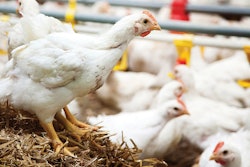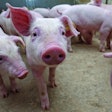
Government will allow US pork imports beginning in January; protesters opposed to ractopamine use
Thousands of people in Taiwan took part in a march over the weekend to protest the government’s decision to allow some imports of U.S. pork starting January 1.
In September, Taiwan’s Council of Agriculture said it had removed restrictions on the use of ractopamine in imported pork and has issued draft regulation establishing a maximum residue limit (MRL).
Ractopamine, a drug that increases animals’ weight gain and feed efficiency, remains banned for use in domestic animal feed in Taiwan. The drug is approved for use in swine and beef in the U.S., but its use is banned in China and the European Union. Pigs that receive ractopamine end up using 10-20% less feed or water to reach final weight gain.
Taiwan’s draft regulation establishes the MRL of ractopamine in pig muscle and fat and edible offal as 0.01 parts per million, and in liver and kidneys as 0.04 parts per million. It would take effect January 1, 2021.
Taiwan had banned ractopamine use in its pork imports since 2007, according to the National Pork Producers Council (NPPC). It said that, in July 2012, Taiwan passed legislation that established an MRL for imported beef but not for pork. The new regulations for pork would provide opportunities for U.S. pork producers to export their product to Taiwan.
Those opposed to the rule change say the use of ractopamine in food-producing animals threatens food safety.
After Taiwan’s government announced the rule change, NPPC vice president and counsel Nick Giordano said it was a “positive” development, pointing to evidence of the safety of ractopamine and what he said is its relatively low usage in the U.S. The drug is approved for use in swine and beef in the U.S., but its use is banned in China and the European Union.
“We appreciate what Taiwan did. We know that this has been an emotional issue there on pork and beef, but it’s taken 15 years,” he said. “I hope I’m wrong, but we don’t think this is going to significantly move the needle there.”













